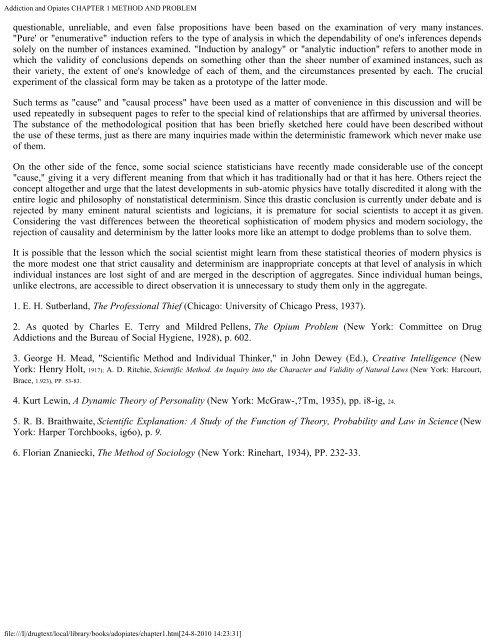Addiction and Opiates
Addiction and Opiates
Addiction and Opiates
Create successful ePaper yourself
Turn your PDF publications into a flip-book with our unique Google optimized e-Paper software.
<strong>Addiction</strong> <strong>and</strong> <strong>Opiates</strong> CHAPTER 1 METHOD AND PROBLEM<br />
questionable, unreliable, <strong>and</strong> even false propositions have been based on the examination of very many instances.<br />
"Pure' or "enumerative" induction refers to the type of analysis in which the dependability of one's inferences depends<br />
solely on the number of instances examined. "Induction by analogy" or "analytic induction" refers to another mode in<br />
which the validity of conclusions depends on something other than the sheer number of examined instances, such as<br />
their variety, the extent of one's knowledge of each of them, <strong>and</strong> the circumstances presented by each. The crucial<br />
experiment of the classical form may be taken as a prototype of the latter mode.<br />
Such terms as "cause" <strong>and</strong> "causal process" have been used as a matter of convenience in this discussion <strong>and</strong> will be<br />
used repeatedly in subsequent pages to refer to the special kind of relationships that are affirmed by universal theories.<br />
The substance of the methodological position that has been briefly sketched here could have been described without<br />
the use of these terms, just as there are many inquiries made within the deterministic framework which never make use<br />
of them.<br />
On the other side of the fence, some social science statisticians have recently made considerable use of the concept<br />
"cause," giving it a very different meaning from that which it has traditionally had or that it has here. Others reject the<br />
concept altogether <strong>and</strong> urge that the latest developments in sub-atomic physics have totally discredited it along with the<br />
entire logic <strong>and</strong> philosophy of nonstatistical determinism. Since this drastic conclusion is currently under debate <strong>and</strong> is<br />
rejected by many eminent natural scientists <strong>and</strong> logicians, it is premature for social scientists to accept it as given.<br />
Considering the vast differences between the theoretical sophistication of modem physics <strong>and</strong> modern sociology, the<br />
rejection of causality <strong>and</strong> determinism by the latter looks more like an attempt to dodge problems than to solve them.<br />
It is possible that the lesson which the social scientist might learn from these statistical theories of modern physics is<br />
the more modest one that strict causality <strong>and</strong> determinism are inappropriate concepts at that level of analysis in which<br />
individual instances are lost sight of <strong>and</strong> are merged in the description of aggregates. Since individual human beings,<br />
unlike electrons, are accessible to direct observation it is unnecessary to study them only in the aggregate.<br />
1. E. H. Sutberl<strong>and</strong>, The Professional Thief (Chicago: University of Chicago Press, 1937).<br />
2. As quoted by Charles E. Terry <strong>and</strong> Mildred Pellens, The Opium Problem (New York: Committee on Drug<br />
<strong>Addiction</strong>s <strong>and</strong> the Bureau of Social Hygiene, 1928), p. 602.<br />
3. George H. Mead, "Scientific Method <strong>and</strong> Individual Thinker," in John Dewey (Ed.), Creative Intelligence (New<br />
York: Henry Holt, 1917); A. D. Ritchie, Scientific Method. An Inquiry into the Character <strong>and</strong> Validity of Natural Laws (New York: Harcourt,<br />
Brace, 1.923), PP. 53-83.<br />
4. Kurt Lewin, A Dynamic Theory of Personality (New York: McGraw-,?Tm, 1935), pp. i8-ig, 24.<br />
5. R. B. Braithwaite, Scientific Explanation: A Study of the Function of Theory, Probability <strong>and</strong> Law in Science (New<br />
York: Harper Torchbooks, ig6o), p. 9.<br />
6. Florian Znaniecki, The Method of Sociology (New York: Rinehart, 1934), PP. 232-33.<br />
file:///I|/drugtext/local/library/books/adopiates/chapter1.htm[24-8-2010 14:23:31]





